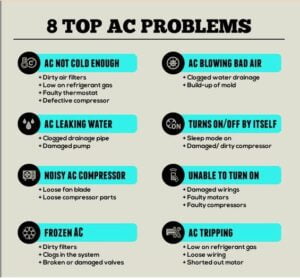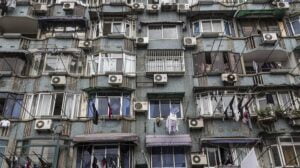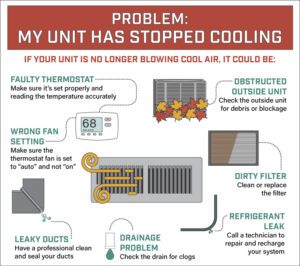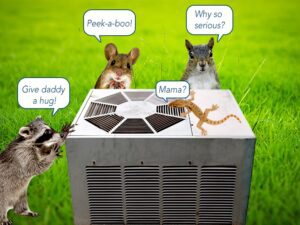What are Cooling problems in air conditioners?
- An air conditioning system is a vital component of modern comfort, keeping indoor spaces cool and pleasant during hot months.
- However, like any complex machinery, air conditioners can face various issues that affect their cooling efficiency.
- In this blog post, we’ll delve into some of the most common cooling problems encountered in air conditioning systems and explore potential solutions.
Insufficient Cooling:
- One of the most frustrating problems homeowners face is an air conditioner that fails to cool adequately.
- Several factors could contribute to this issue:
Dirty Air Filters:
- Clogged air filters restrict airflow, leading to reduced cooling efficiency.
- Regularly replacing or cleaning the filters can significantly improve cooling performance.
Blocked Condenser Unit:
- Debris leaves, and other obstructions around the outdoor condenser unit can impede heat exchange.
- Regularly clean the area around the condenser to ensure optimal airflow.
Low Refrigerant Levels:
- A refrigerant leak can cause insufficient cooling. Contact a professional technician to diagnose and repair leaks, followed by recharging the refrigerant to the appropriate levels.

Uneven Cooling:
Uneven temperature distribution across different rooms or areas can be a frustrating experience. Address this issue by:
- Balancing Vents: Ensure that all supply and return vents are unobstructed by furniture or other objects, allowing for even airflow.
- Thermostat Placement: Avoid placing the thermostat near heat sources, as this can result in inaccurate temperature readings. The thermostat should be located in a central area of the home for more accurate control.
AC Not Turning On:
If your air conditioner isn’t turning on, several factors might be at play:
- Circuit Breaker: Check the circuit breaker or fuse box to ensure the AC unit is receiving power. Reset any tripped breakers.
- Thermostat Issues: Verify that the thermostat is set to cooling mode and the desired temperature. Replace batteries if necessary.
- Power Issues: Check if the AC unit is receiving power. Tripped circuit breakers or blown fuses could be the cause.
- Wiring Problems: Wiring issues can disrupt communication between components, preventing the system from starting.
AC Running Constantly
An air conditioner that runs non-stop might signal an underlying issue:
- Sizing Mismatch:
- An undersized AC unit struggles to cool large spaces efficiently, leading to continuous operation.
- Consult a professional to determine if your unit’s capacity matches your room size.
- Thermostat Settings: Ensure the thermostat’s temperature setting isn’t unrealistically low, causing the AC to run constantly.
Warm Air Blowing:
If your AC is blowing warm air, consider the following solutions:
- Thermostat Settings:
- Double-check that the thermostat is in cooling mode and set to the desired temperature.
- Refrigerant Issues:
- Low refrigerant levels or leaks can cause warm air circulation.
- Contact a professional technician to address refrigerant-related problems.
Strange Noises:
Unusual sounds from your AC unit could indicate mechanical issues:
- Loose Parts:
- Rattling or clanking noises may point to loose components. Inspect the unit and tighten any loose parts.
- If unsure, seek professional assistance.
- Fan or Motor Problems:
- Squealing or grinding noises could be caused by fan or motor issues. These require immediate attention from a professional.
- Banging or Clanking: Loose or broken parts within the AC unit can cause these noises.
- Hissing or Bubbling: Refrigerant leaks can create hissing or bubbling sounds.
- Squealing: Worn-out belts or motor bearings can produce high-pitched squealing sounds.
Frequent Cycling On and Off:
- Dirty Condenser or Evaporator Coils: Accumulated dirt on these coils can lead to inefficient cooling and frequent cycling.
- Refrigerant Issues: Improper refrigerant charge or leaks can cause the AC to cycle too often.
- Thermostat Malfunction: A faulty thermostat might cause the system to cycle on and off unnecessarily.
Water Leakage:
-
- Clogged Condensate Drain Line: If the drain line is blocked, water can back up and leak from the unit.
Improper Installation:
Poor installation can lead to improper drainage and water leakage.
Frozen Evaporator Coil:
- Airflow Restrictions: Dirty air filters, blocked vents, or closed registers can impede airflow and cause the evaporator coil to freeze.
- Low Refrigerant Levels: Insufficient refrigerant can cause the evaporator coil to freeze
Common Air Conditioning Problems Faced in India
- As the sweltering heat of Indian summers takes its toll, air conditioning becomes a lifeline for comfort and productivity.
- However, like any mechanical system, air conditioners can encounter issues that disrupt their cooling efficiency.
- This article aims to shed light on some prevalent air conditioning problems faced by residents of India and offers insights into tackling these challenges.
Voltage Fluctuations:
India’s erratic power supply often leads to voltage fluctuations, which can harm air conditioning units:
- Solution:
- Invest in a voltage stabilizer to protect your AC from voltage fluctuations.
- These devices regulate the power supply and prevent damage.
Dust and Humidity:
Indian cities experience high levels of dust and humidity, which can negatively impact AC performance:
- Solution: Regularly clean and maintain your AC’s filters to prevent dust buildup. Consider using dehumidifiers in areas with high humidity.
Insufficient Cooling:
With scorching temperatures, inadequate cooling is a major concern:
- Solution: Ensure your AC’s filters are clean and the outdoor unit is free from debris. Consult a professional to check refrigerant levels and address leaks.
Inconsistent Power Supply:
Frequent power outages and surges can harm AC units:
- Solution: Install an uninterruptible power supply (UPS) or an inverter to keep your AC running during power interruptions.
Clogged Drainage Lines:
Humidity and dust can lead to clogged drainage lines, causing water leakage and inefficiency:
- Solution: Regularly inspect and clean the drainage lines to prevent blockages. Consult a technician if you notice water leakage.
Incorrect Sizing:
Choosing an AC with inadequate cooling capacity for your room size can result in poor performance:
- Solution: Consult a professional to determine the appropriate AC capacity for your space. Avoid oversizing, as it can lead to higher energy consumption.
Refrigerant Leaks:
Leaks in the refrigerant circuit can reduce cooling efficiency:
- Solution: If you suspect a refrigerant leak (indicated by reduced cooling and hissing sounds), consult a technician to repair the leak and recharge the refrigerant.
Thermostat and Sensor Issues:
Malfunctioning thermostats or sensors can lead to improper temperature control:
- Solution: Calibrate or replace faulty thermostats and sensors. Ensure they are not obstructed by objects affecting their accuracy.
Inadequate Maintenance:
Lack of regular maintenance can lead to various AC problems:
- Solution: Schedule annual maintenance checks with a professional technician. Regular cleaning, filter replacement, and system inspections can prevent issues.
Wiring Problems:
Faulty wiring can lead to electrical issues and reduced AC efficiency,Note than Poor quality and damaged or spliced cables can also result in low voltage:
- Solution: Have your AC’s electrical connections inspected by a qualified electrician. Faulty wiring can pose safety risks and affect performance.
Rat Infestations in Your Air Conditioning System: Causes and Solutions
- Air conditioning systems are a haven of comfort in scorching temperatures, but they can also become a sanctuary for unwanted visitors.
- Rats and rodents seeking shelter, warmth, and food can cause significant damage to AC units.
- In this article, we’ll explore the causes of rat infestations in air conditioning systems and discuss effective solutions to tackle this problem.
Causes of Rat Infestations in AC Units:
Rats are attracted to air conditioning systems for several reasons:
- Warmth and Shelter: AC units offer cozy and hidden spaces that shield rats from the weather and predators.
- Electrical Wiring: Rats often chew on wires, and AC units’ electrical components become targets, potentially leading to system malfunction or fires.
- Food Sources: Dust, debris, and sometimes moisture accumulate in AC units, creating a potential food source for rats.
- Easy Access: The gaps around the pipes and wiring leading into the house provide rats with easy entry points.
Signs of Rat Infestations in AC Units:
- Unusual Noises: Scratching, scuttling, or squeaking sounds coming from your AC unit could indicate rodent activity.
- Foul Odors: A persistent foul smell from the AC could be due to rat droppings and urine.
- Reduced Cooling Efficiency: Rats may damage or block components, reducing the AC’s cooling efficiency.
Solutions to Avoid Rats in AC:
- Preventive Measures:
- Seal Entry Points: Block gaps and openings around pipes, wiring, and outdoor units to prevent rats from entering.
- Regular Cleaning: Keep the area around your AC unit clean to minimize potential food sources and nesting materials.
- Trim Vegetation: Trim trees and shrubs near the AC unit to reduce hiding spots for rodents.
- Use Rat-Repellent Measures:
- Mothballs: Place mothballs or cotton balls soaked in peppermint oil near the AC unit, as rats dislike the strong odor.
- Ultrasonic Repellers: Consider using ultrasonic devices designed to emit sounds unpleasant to rodents.
- Traps: Strategically place rat traps near the AC unit to capture rodents. Check local regulations before using traps.
- Professional Help:
- Exterminators: If the infestation is severe, consult a professional exterminator to assess the extent of the problem and recommend appropriate measures.
- HVAC Technician: If rats have damaged your AC unit, contact an HVAC technician to inspect and repair any issues.
- Regular Maintenance:
- Scheduled Inspections: Include AC unit inspections in your regular maintenance routine to catch and address any rat-related damage early.
- Cleaning: Regularly clean the unit’s interior components to discourage rodent nesting.
- Secure Wiring:
- Cover Wiring: Use conduit or tubing to cover wiring and prevent rats from chewing on them.
- Rat infestations in air conditioning systems can lead to damage, inefficiency, and potential health hazards due to droppings and contamination.
- By implementing preventive measures, using rat-repellent techniques, seeking professional help when needed, and maintaining your AC unit properly, you can keep these unwanted visitors at bay and enjoy cool, comfortable indoor spaces without disruptions.
- Remember that if the infestation is severe or if the AC unit has been significantly damaged, seeking assistance from professionals is crucial for effective resolution.
Which is the best AC service brand in India
- Air conditioning is an essential part of life in India’s hot and humid climate.
- By understanding and addressing these common AC problems, you can ensure your cooling system operates efficiently and provides the comfort you need.
- Regular maintenance, professional inspections, and investing in appropriate accessories like voltage stabilizers can help you enjoy the benefits of air conditioning without frequent disruptions.
- Obstacles in cooling air due to rats can cause cooling problem in AC.
- If you’re unsure about any AC-related issue, always consult a reputable HVAC professional for accurate diagnosis and effective solutions.
- Voltas AC Problems
- Blue star
- Samsung AC Problem:
- LG AC
- Its customer care representatives are known to be extremely responsive and get your issues fixed as soon as possible. Other brands that follow Voltas in after-sales service are Samsung and Carrier
Conclusion:
- Air conditioning systems play a crucial role in maintaining indoor comfort, and addressing cooling problems promptly can save you from discomfort and costly repairs.
- Regular maintenance, including cleaning or replacing air filters and scheduling professional check-ups, can prevent many of these issues.
- However, if you encounter persistent cooling problems, it’s wise to consult a qualified HVAC technician to diagnose and resolve the underlying causes effectively.
- Remember, a well-maintained air conditioner ensures you stay cool and comfortable, even on the hottest days.






